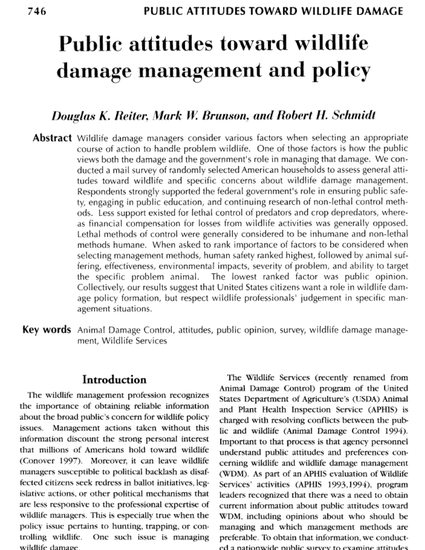
Article
Public Attitudes Toward Wildlife Damage Management and Policy
The Wildlife Society Bulletin
(1999)
Abstract
Wildlife damage managers consider various factors when selecting an appropriate course of action to handle problem wildlife. One of those factors is how the public views both the damage and the government's role in managing that damage. We conducted a mail survey of randomly selected American households to assess general attitudes toward wildlife and specific concerns about wildlife damage management. Respondents strongly supported the federal government's role in ensuring public safety, engaging in public education, and continuing research of non-lethal control methods. Less support existed for lethal control of predators and crop depredators, whereas financial compensation for losses from wildlife activities was generally opposed. Lethal methods of control were generally considered to be inhumane and non-lethal methods humane. When asked to rank importance of factors to be considered when selecting management methods, human safety ranked highest, followed by animal suffering, effectiveness, environmental impacts, severity of problem, and ability to target the specific problem animal. The lowest ranked factor was public opinion. Collectively, our results suggest that United States citizens want a role in wildlife damage policy formation, but respect wildlife professionals' judgement in specific management situations.
Keywords
- public attitudes,
- wildlife damage,
- management,
- policy
Disciplines
Publication Date
1999
Citation Information
Reiter, D. K., M. W. Brunson, and R. H. Schmidt. 1999. Public attitudes toward wildlife damage
management and policy. Wildlife Society Bulletin 27:746-758.
